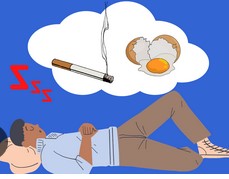Thursday, 12 October 2023
Targeted memory reactivation during sleep

Today I’d like to talk a bit about learning passively while you sleep—for example, by playing a recording. As it turns out, this process seems to work only for very simple forms of associative learning under very specific conditions. You can’t learn anything completely new in your sleep. So, for example, if you play Spanish or French language tapes during the night, without doing anything else, you won’t get any results, except for maybe a bad night’s sleep.
But researchers have learned that under very specific experimental conditions, certain relatively simple forms of implicit associative learning may be observed—perhaps not spectacular, but at least statistically significant. This learning approach is now known as targeted memory reactivation (TMR). For example, when someone is in a state of deep sleep, exposing them to very specific stimuli that have previously been associated with things that they have learned during the day may help to consolidate that learning to some extent. In one pioneering experiment, while subjects were learning to locate objects in two-dimensional space, they were exposed to a floral aroma. The following night, some of these subjects were exposed to this same aroma while they were in deep sleep, while others were not. The subjects who had been exposed to this aroma during the night remembered the locations of the objects better than the subjects who had not. But the amount of improvement in this new learning was only 5 to 15%, which is not very much.
In another experiment, smokers who were exposed to the smell of cigarettes mixed with the smell of rotten eggs while in Stage 2 deep sleep smoked fewer cigarettes in the days following this negative conditioning. Significant results were also obtained when subjects were exposed again during deep sleep to an odour to which they had been exposed as context when they were performing a declarative memory task while awake.
Some positive results have also been obtained with learning of motor skills and emotional responses, as well as in experiments where subjects in deep sleep were presented with associations between smells and sounds and then remembered these associations while awake the following day. But what a brain in deep sleep can perceive and process from the outside world is still limited: it seems quite hard to learn anything even slightly complex when you’re asleep.
Sleep and Dreams | Comments Closed







